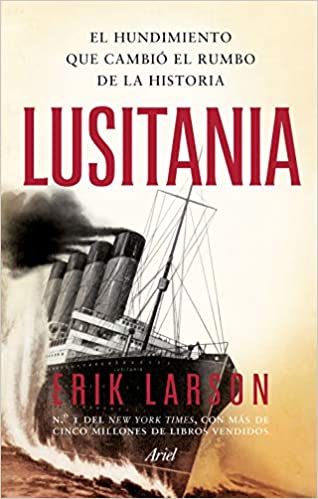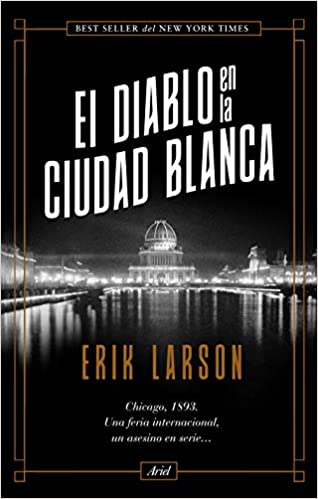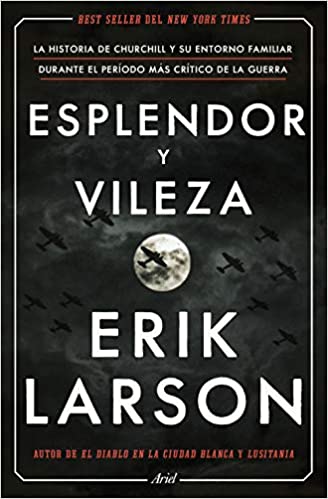There are authors who enjoy narrating at the threshold where the surprising reality appears to be fictional, at least because of the surprising nature of the facts presented. Erik larson it is one of the most disturbing. Because drawing on surprising historical knowledge, which comes from his own research, This American narrator takes us through a world that sounds like disconcerting uchronias, but that simply coexist with our daily life. in a parked, buried way, unknown to the common people. Life always gains nuances when a journalist, acting as a detailed chronicler, brings us closer to that deep knowledge of things.
Imagine a JJ Benitez Yankee style, only a darker point, more inclined to the black chronicle, to crime, to plots to confirm, overthrow or destabilize powers. In one case or another it is about investigating, filling with drops of imagination and delimiting everything by a pragmatic narrative. Narrative with intelligent use of language to shade certainties and outline or highlight what may be assumption or fiction. It's all a matter of impressions. Reality is entirely subjective and a good narrator can use resources to create literature or literary sleight of hand.
If the author in question is also a journalist, it is then understood that this management of the story is a matter of knowledge of communicative resources that they would never use as mere transmitters of what happened. But books are something else, even the supposed canons of History are. And whoever sits down to read a book, even an essay, knows that he will not find, nor does he want to, plumb truths, nor axioms of faith, bibles apart...
Top 3 Recommended Books by Erik Larson
Lusitania: The sinking that changed the course of history
It's like everything. We are always left with one example, perhaps the most anecdotal. The same thing happened with the arrival of man to the moon. There were 12 astronauts who set foot on the moon in six manned expeditions in total. Few know it. The Titanic, for its part, was the great sinking of History, the paradigm of human vanity overthrown by nature. But be careful in the case of the Lusitania, which was even worse.
Immense and luxurious, the Lusitania, which sailed from New York on May 1, 1915, was a monument to the pride and ingenuity of the time, the fastest civilian ship. With the complete passage, he left calmly despite the existing warlike atmosphere. The idea that a German submarine could sink it seemed absurd, a sentiment echoed by the shipping company: 'The Lusitania It is the safest ship in the sea. It is too fast for any submarine. No German warship can reach or come close to it. '
At around two in the afternoon on May 7, the ship was hit by a torpedo fired by a German submarine. In just twenty minutes it sank and there were 1.200 dead, most of them American citizens. This tragedy was used by the press to create a climate of opinion conducive to participation in the war. But what is the truth about this sinking? Was it an event orchestrated to justify America's entry into the Great War? Was it loaded with explosive material for Great Britain? Could a disaster like this have been avoided?
With a rich cast of characters and an original approach, Lusitania allows readers to experience the journey and tragedy in real time, as well as discover intimate details that had been hidden by the mists of history.
The devil in the White City
Every story reveals wonderful contrasts, whether in its luminosity or its shadows. Between the appearances of social life and the basements where everyone keeps their masks, unsuspected hells may end up appearing. The idea of Jeckyl and Mr Hyde is too true a hyperbole to admit that it is just that, an exaggeration...
Both were intelligent and stubborn, and the desire to succeed pushed them further and further: the architect Daniel Hudson Burnham was commissioned to design and build the pavilions for the Chicago World's Fair, which would open its doors in May 1893; Henry H. Holmes was a doctor and decided to apply his knowledge during the exhibition in the most cruel way. While Burnham was building the walls of spectacular palaces, Holmes had torture rooms built in the cellars of his house in which countless women would meet their deaths.
What seems like the plot of a horror novel was at the end of the XNUMXth century a reality that shook an entire country and that had as exceptional witnesses such disparate men as Buffalo Bill, Theodore Dreiser and Thomas Edison. The tribulations of the architect and the doctor, examples of pride and the most unfathomable evil, come down to us thanks to this extraordinary book, the story of madness.
Splendor and Vileness: The Story of Churchill and His Family Environment During the Most Critical Period of the War
Churchill, the last English pirate tasked with dividing up Europe after World War II. A character of the first magnitude to understand the Europe of the allies where he was the interlocutor with the rescuers, the messenger, the one who ends up setting the tone in all negotiations. A guy who coined the phrase "our adversaries are in front, our enemies, behind»About the view of the opposition in parliament and fellow party members on your own bench… I had to be smart and forewarned like a fox.
It seems that we know everything (or almost everything) of Winston Churchill. And yet, as in all life, something always eludes us. And it is there, in those gaps left aside by official or critical historiography, where the exceptional narrative talent of Erik Larson enters. Circumscribed to a very specific period, from May 1940 to May 1941, the bloodiest period of the Blitz, this book narrates, almost like a novel, “how Churchill and his circle survived on a daily basis: the small episodes that reveal how people lived in life. truth under Hitler's tempest of steel. That was the moment when Churchill became Churchillwhen he made his most impressive speeches and showed the world what courage and leadership were.
In this work we have the great statesman, the orator and the leader who never seemed to lose the north, but also the man who doubted his own decisions, the aristocrat and convivial that he missed the youth, the sentimental and the angry. The multifaceted Churchill built himself a character as a story with a capital letter. Larson tells it by tracing the chiaroscuro of the lowercase letters. After all, as Churchill himself told his secretary: "If words mattered, we should win this war."



